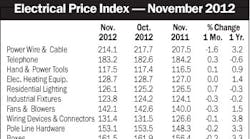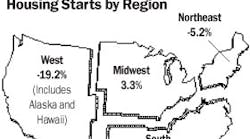Latest from Mag
People - Dec 21, 2012
Obituaries - Dec 21, 2012
November EPI Index Shows No Change
Housing Starts Dip 4% in November
Electrical Marketing - December 21, 2012
Around the Industry - Dec 21, 2012
The surety industry is experiencing one of its most tumultuous periods in its history, said the vice president of a Chicago-based insurance brokerage firm.
Bill Krumm of Near North Insurance Brokerage Inc. said high-profile bankruptcies, continuing losses and the effects of Sept. 11 have taken a toll on the industry.
“As a result of those events, we're seeing that capacity is decreasing, pricing is increasing and underwriting is tightening,” Krumm said.
Wayne Nunziata of Montvale, N.J.-based Colonial Surety Co. said along with those other factors, the number of reinsurance companies has decreased from more than 20 to less than 10.
“You have the consolidation of the national companies and the elimination of a lot of local and regional companies because they just went out of business,” he said. “They just wrote too freely.”
Electrical contractors are required by law to secure surety bonding for federal construction projects. Due to the slowing economy and sagging construction market, more electrical contractors are required to get bonded, even if they're not working on public projects.
“Generally, the electrical is the sub to the general contractor and unless the electrical contractor bids a job direct to a public owner, there's not necessarily a requirement for performance and payment bonds,” Krumm said. “More and more, as part of the tightening of the underwriting community, subcontractors are being asked to provide bonds for jobs.”
The industry has also had a terrible loss ratio, Nunziata said. “The pure loss ratio last year, before commissions, expenses and overhead, was more than 70 percent in the industry,” he said. “That means for every $100 they took in, they paid out $70 in losses without expenses. The last two years, the surety industry has had a loss ratio and expense ratio of well over 100 percent. That jumped dramatically around five years ago, when it was 30 percent.”
While many surety and insurance companies have closed their doors, a large number of contractors have also folded. About 10,000 contractors go out of business each year according to Dun and Bradstreet.
“The construction market has been difficult and most of these guys have had a tough time,” Nunziata said. “That's why it's important for them to make sure that their line of credit is preserved.”

